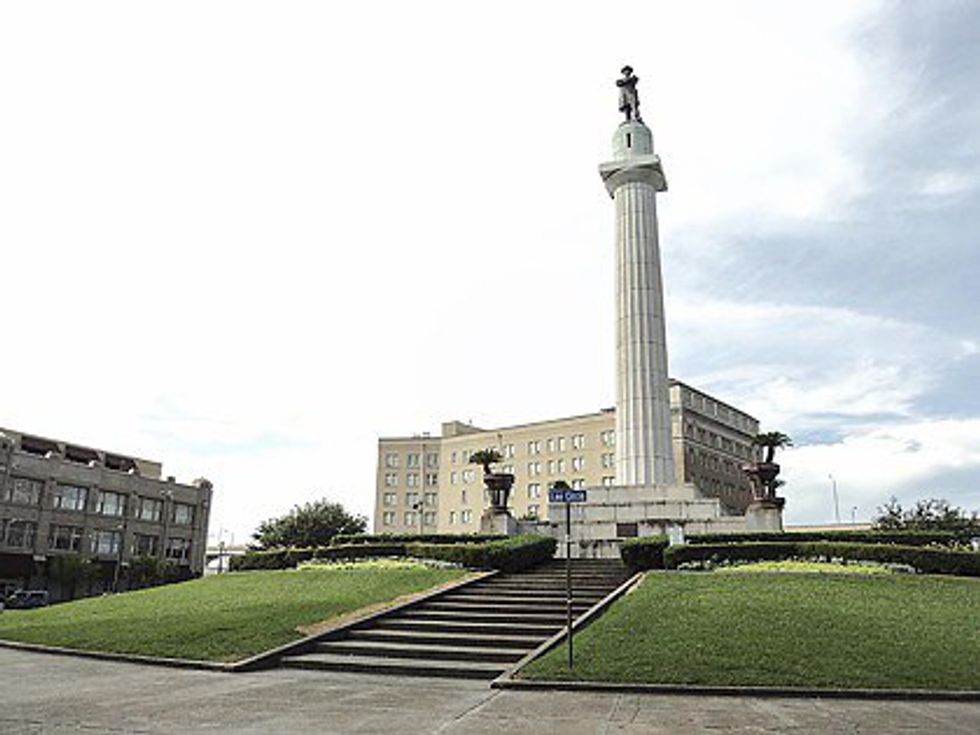New Orleans (especially the French Quarter) is a city very near and dear to my heart. From the winos on Canal Street to Doreen Ketchens and her clarinet filling the air with sweet music on Royal Street, my heart and soul belong to New Orleans.
On Thursday, city council members voted 6-1 to remove four Confederate statues and monuments, including the 131 year old statue of General Robert E. Lee which stands in the center of Lee Circle.
Robert E. Lee on Lee Circle next to Lee Drive by the Lee Railroad leeleeleelee
The initiative is an attempt by the city to sever ties with Louisiana's Confederate past and move forward into a new age of enlightenment, understanding, and love.
And I am wholly against it.
I am a Southerner, born and raised. I am proud of that fact to no end, especially because our food, manners, and accents just can't be beat.
What I am not proud of is our often-parodied, much-maligned (and rightfully so) history. In fact, the quickest way to get me to shut up about my southern pride is to mention the 1600s to the 1960s. I will never say "heritage, not hate", because whether we like it or not, hate is our heritage. When it comes to the treatment of persons of color, our track records is abysmal, and anybody who can't recite Dale Earnhardt's stats at the drop of a hat will agree.
These monuments to once-venerated men deserve to stand as gleaming reminders of our history mired in prejudice and hatred and warnings against future injustices. These statues should serve as a constant reminder of what we once were and must never allow ourselves to be again. Our national history is not an Instagram profile; we cannot simply delete the unseemly aspects to make ourselves appear to be innocent.
These statues are, over a century after their erection (stop laughing, grow up), no longer points of pride intended to evoke reverence and respect. They are tangible reminders of a not-too-distant time when black Americans were considered property. Of a time of "separate but equal" ideology. Of a time when basic human liberties were still denied to many a mere 30 years before many of my generation were born.
When one sees "Jefferson Davis" emblazoned across a plaque shrouded in patina, disgust should be the instinctive reaction. Disgust, hatred, confusion, the entire gamut of negatively charged emotions. To remove them from the public sight is to confine the tragedies of yesteryear to the classrooms and libraries, where they will become distant, caked with dust and, over time, forgotten.
These symbols of hatred are not time capsules which hold America's prejudices within their copper lining. They are not some kind of Gone-With-the-Wind-themed "Pandora's Box", locked and loaded to fill the world with hate. There is no next step to confronting the horrific ideologies which these men fought to defend after this. Tearing down a statue will not do anything to alter the bigotry that lives on in the hearts and minds of so many. The only thing that this sudden wave of mob mentality will accomplish is relegating America's past to just that; its past. Racial inequality is still a persistent problem in contemporary America and, at the risk of sounding like a pessimist, will more than likely be a problem long after I die. This isn't a matter of mere history. These statues' very existence into the 21st century is an act of defiance against the romanticization of the Old South. The sins committed by these men do not deserve to be forgotten. To remove the statues is to absolve those that they honor, and any attempt to do so is both foolish and insensitive.
Monuments such as these should be treated as the scars on the face of our great nation that they are; we should cringe when we look up at them, we should tense up when we walk past them. These statues should humble us, sadden us, embarrass us, infuriate us, force us to confront the past in our daily routines and consider their implications in the modern day.
So to those advocating for the removal of these statues, attempting to (no pun intended) whitewash history, I say:
You can sweep everything under the rug, but you still won't have a clean house.




 StableDiffusion
StableDiffusion StableDiffusion
StableDiffusion StableDiffusion
StableDiffusion Photo by
Photo by  Photo by
Photo by  Photo by
Photo by 
 Photo by
Photo by  Photo by
Photo by  Photo by
Photo by  Photo by
Photo by  Photo by
Photo by 












